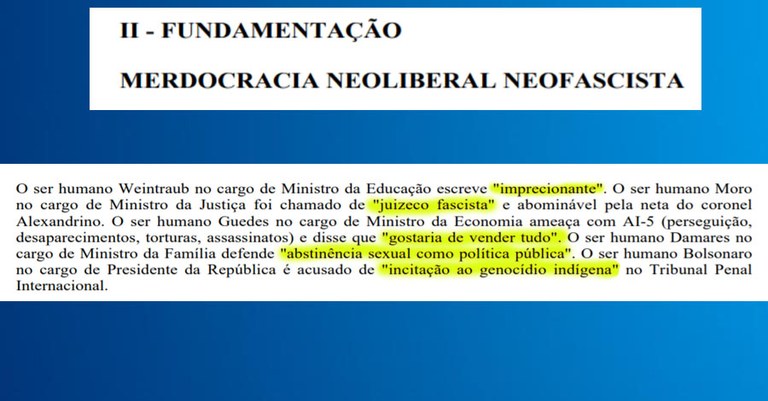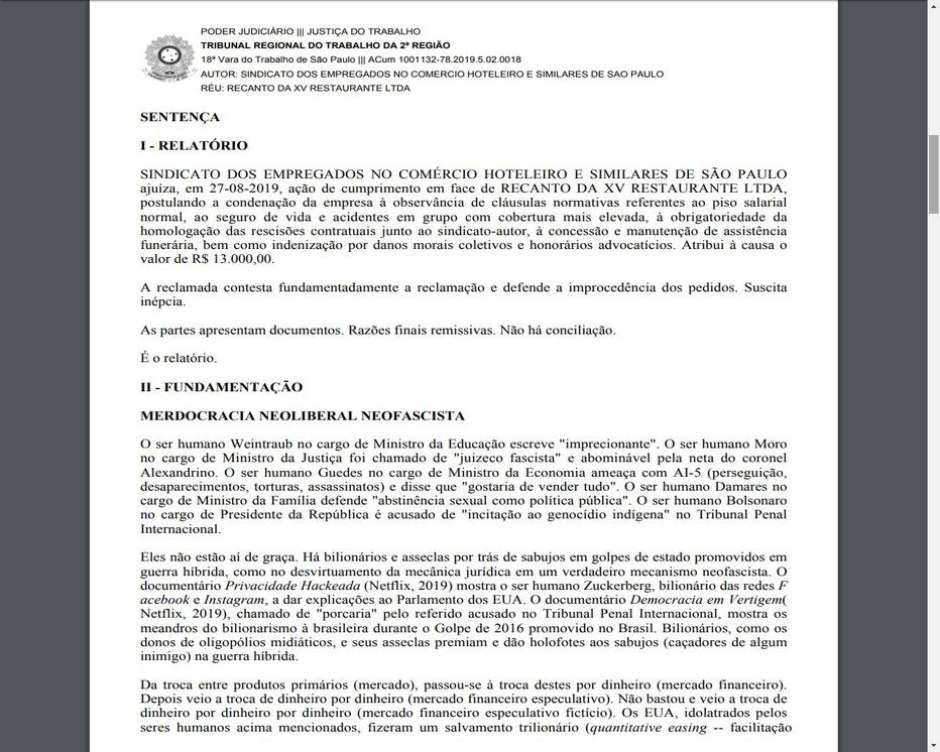RIO DE JANEIRO, BRAZIL – Labor court judge Jerônimo Azambuja Franco Neto described the current moment in Brazil as a “neoliberal neo-fascist crapocracy” when handing down a decision in a labor case, published on Thursday, 16th.
“The neo-liberal neo-fascist crapocracy is there for anyone who wants or can see it,” wrote the substitute judge in the 18th Labor Court of São Paulo, of the Regional Labor Court of the 2nd Region.

Azambuja ordered the restaurant ‘Recanto da XV’ to pay compensation of R$10,000 (US$2.500) for moral damages and to demonstrate the payment of the salary floor, life and accident insurance and funeral assistance to employees. The decision was handed down following a lawsuit brought by the Union of Employees in the Hospitality and Similar Industry of São Paulo. The sentence is still open for appeal.
In the sentence, the magistrate criticizes officials in Bolsonaro’s government, such as Abraham Weintraub, Minister of Education; Sérgio Moro, Minister of Justice and Public Safety; Paulo Guedes, Minister of Economy; and Damares Alves, Minister of Women, Family and Human Rights, in addition to President Jair Bolsonaro himself.
“The man Weintraub in the position of Minister of Education writes ‘imprecive’. The man Moro in the position of Minister of Justice was called a ‘fascist little judge’ and abominable by the granddaughter of Colonel Alexandrino. The man Guedes in the position of Minister of Economy threatens with the AI-5 (persecution, disappearances, torture, murder) and said he ‘would like to sell everything’. The woman Damares in the position of Minister of Family advocates ‘sexual abstinence as public policy’. The man Bolsonaro in the office of President of the Republic is accused of ‘incitement to indigenous genocide’ in the International Criminal Court”.
The term “crapocracy,” Azambuja says, “comes to synthesize the power attributed to people who ‘crap up’ and/or perpetuate the ‘crap’ done. And all this in the name of an agenda that is conventionally called neoliberal, that is, to liberate the economy so that crap can be done”.
In addition to the president and some ministers, the sentence criticizes the Lava Jato prosecutor Deltan Dallagnol, the Labor Reform approved by Michel Temer’s administration and the Economic Freedom Act, sanctioned in September 2019 by Bolsonaro. The magistrate further refers to what he calls the “destruction of Social Welfare,” in reference to the Pension Reform passed last year.

The decision further mentions the murder of city councilor Marielle Franco and says the current moment has generated “political exiles,” referring to former Federal Deputy Jean Wyllys and philosopher Márcia Tiburi – who was a Worker’s Party (PT) candidate for the government of Rio – who left Brazil in the wake of Bolsonaro’s election.
In the conclusion of the “grounds” of the sentence, Azambuja says that his decision aims to contribute to the “downfall” of what he terms a “neo-fascist neoliberal crapocracy”. “The place of speech of the present decision, therefore, is not turned to the market or to profit, which already has their billionaires, crooks and pet minions. The place of speech of the present decision is the dignified human work aimed at equality and fundamental human rights”.
Article 22 of the Code of Ethics for the Judiciary states that the magistrate must use “polite, respectful and understandable” language.
Azambuja, the Regional Labor Court of the 2nd Region and the CNJ were unavailable to comment on the case.
AGU states that this is the ‘language’ of a ‘partisan’
The Federal Solicitor General (AGU), André Mendonça, said on Twitter that the “language used in the sentence – typical of a party militant, not a judge – strays from the legal practice and clearly violates the Code of Ethics of the Magistracy. “The AGU will act before the National Council of Justice,” wrote the minister.
Jerônimo Azambuja Franco Neto, 35, is a native of Bagé, Rio Grande do Sul. He was a technician and analyst at the Regional Labor Court (TRT) of the 4th Region (RS) before being approved in the top position in the 40th concourse for TRT judges in São Paulo in 2014. He was the speaker for his class in the inauguration in 2016 and, according to information on the TRT-2 webpage, in his speech he said that the Labor Court system was experiencing a crisis that would ultimately strengthen it.

In August 2018, Judge Jerônimo Azambuja Franco Neto engaged in an “argument”, through articles published on the Legal Consultant website, with the former Federal Supreme Court (STF) Justice Eros Grau.
Together with another author, Lenio Streck, Azambuja published an article in which he criticized the outsourcing of the workforce and the way courts were handling labor rights.
In reaction to the text, Eros Grau published an article on the same website in which he criticized Azambuja and Streck’s views, classifying his text as “complex and confusing” and saying that this “seemingly” intended to be “more amusing than legal”. When talking about the authors, Grau says to know and have good consideration for Streck, but in relation to Azambuja he says “not knowing who he is”.
Azambuja and Streck then wrote a new article in which they defend themselves from the former minister’s criticisms, saying that Grau showed “clear contempt for the ‘other'” – in this case, Judge Jerônimo Azambuja. “This form of addressing someone (Judge Jerónimo) is an intrinsic feature of the ethical closure of individuals by the commodifying ideology that prevails in a kind of Economic Analysis of Moral,” read the “rebuttal”.

